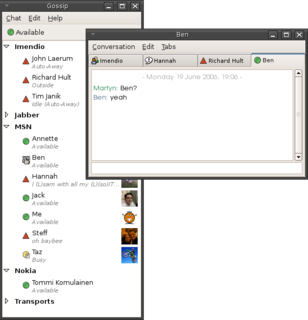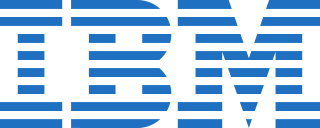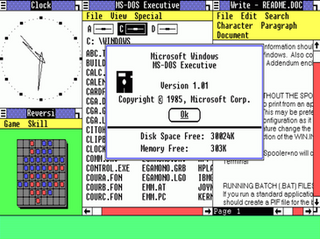
Free software or libre software, infrequently known as freedom-respecting software, is computer software distributed under terms that allow users to run the software for any purpose as well as to study, change, and distribute it and any adapted versions. Free software is a matter of liberty, not price; all users are legally free to do what they want with their copies of a free software regardless of how much is paid to obtain the program. Computer programs are deemed "free" if they give end-users ultimate control over the software and, subsequently, over their devices.

Instant messaging (IM) technology is a type of online chat allowing real-time text transmission over the Internet or another computer network. Messages are typically transmitted between two or more parties, when each user inputs text and triggers a transmission to the recipient(s), who are all connected on a common network. It differs from email in that conversations over instant messaging happen in real-time. Most modern IM applications use push technology and also add other features such as emojis, file transfer, chatbots, voice over IP, or video chat capabilities.
HCL Notes and HCL Domino are the client and server, respectively, of a collaborative client-server software platform formerly sold by IBM, now by HCL Technologies.
Taligent was an American software company. Based on the Pink object-oriented operating system conceived by Apple in 1988, Taligent Inc. was incorporated as an Apple/IBM partnership in 1992, and was dissolved into IBM in 1998.
Lotus Software was an American software company based in Massachusetts; it was "offloaded" to India's HCL Technologies in 2018.

Db2 is a family of data management products, including database servers, developed by IBM. It initially supported the relational model, but was extended to support object–relational features and non-relational structures like JSON and XML. The brand name was originally styled as DB/2, then DB2 until 2017 and finally changed to its present form.
A software company is a company whose primary products are various forms of software, software technology, distribution, and software product development. They make up the software industry.

A software release life cycle is the sum of the stages of development and maturity for a piece of computer software ranging from its initial development to its eventual release, and including updated versions of the released version to help improve software or fix software bugs still present in the software.

SAP SE is a German multinational software company based in Walldorf, Baden-Württemberg. It develops enterprise software to manage business operations and customer relations. The company is the world's leading enterprise resource planning (ERP) software vendor. SAP is the largest non-American software company by revenue, the world's third-largest publicly traded software company by revenue, and the second largest German company by market capitalization. Apart from ERP software the company also sells database software and technology, cloud engineered systems, and other ERP software products, such as human capital management (HCM) software, customer relationship management (CRM) software, enterprise performance management (EPM) software, product lifecycle management (PLM) software, supplier relationship management (SRM) software, supply chain management (SCM) software, business technology platform (BTP) software and programming environment SAP AppGyver for business.

TopView is the first object-oriented, multitasking, and windowing, personal computer operating environment for PC DOS developed by IBM, announced in August 1984 and shipped in March 1985. TopView provided a text-mode operating environment that allowed users to run more than one application at the same time on a PC. IBM demonstrated an early version of the product to key customers before making it generally available, around the time they shipped their new PC AT computer.

Google Analytics is a web analytics service offered by Google that tracks and reports website traffic, currently as a platform inside the Google Marketing Platform brand. Google launched the service in November 2005 after acquiring Urchin.

The IBM Simon Personal Communicator is a handheld, touchscreen PDA designed by International Business Machines (IBM), and manufactured by Mitsubishi Electric. Although the term "smartphone" was not coined until 1995, because of Simon's features and capabilities, it has been retrospectively referred to as the first true smartphone.

Linux is an open-source Unix-like operating system based on the Linux kernel, an operating system kernel first released on September 17, 1991, by Linus Torvalds. Linux is typically packaged as a Linux distribution.
Proprietary software, also known as non-free software or closed-source software, is computer software for which the software's publisher or another person reserves some licensing rights to use, modify, share modifications, or share the software, restricting user freedom with the software they lease. It is the opposite of open-source or free software. Non-free software sometimes includes patent rights.

Windows 1.0 is the first major release of Microsoft Windows, a family of graphical operating systems for personal computers developed by Microsoft. It was first released to manufacturing in the United States on November 20, 1985, while the European version was released as Windows 1.02 in May 1986.
The IBM Quantum Composer and the IBM Quantum Lab form an online platform allowing public and premium access to cloud-based quantum computing services provided by IBM Quantum. This includes access to a set of IBM's prototype quantum processors, a set of tutorials on quantum computation, and access to an interactive textbook. As of February 2021, there are over 20 devices on the service, six of which are freely available for the public. This service can be used to run algorithms and experiments, and explore tutorials and simulations around what might be possible with quantum computing.

Joy Adowaa Buolamwini is a Ghanaian-American-Canadian computer scientist and digital activist based at the MIT Media Lab. Buolamwini introduces herself as a poet of code, daughter of art and science. She founded the Algorithmic Justice League, an organization that works to challenge bias in decision-making software, using art, advocacy, and research to highlight the social implications and harms of artificial intelligence (AI).

Kathy Pham is a Vietnamese American computer scientist and product management executive. She has held roles in leadership, engineering, product management, and data science at Google, IBM, the Georgia Tech Research Institute, Harris Healthcare, and served as a founding product and engineering member of the United States Digital Service (USDS) in the Executive Office of the President of the United States at The White House. In 2021, Pham was named the Deputy Chief Technology Officer of the Federal Trade Commission.

Qiskit is an open-source software development kit (SDK) for working with quantum computers at the level of circuits, pulses, and algorithms. It provides tools for creating and manipulating quantum programs and running them on prototype quantum devices on IBM Quantum Experience or on simulators on a local computer. It follows the circuit model for universal quantum computation, and can be used for any quantum hardware that follows this model.

The Social Dilemma is a 2020 American docudrama film directed by Jeff Orlowski and written by Orlowski, Davis Coombe, and Vickie Curtis. The documentary examines how social media's design nurtures addiction to maximize profit and its ability to manipulate people's views, emotions, and behavior and spread conspiracy theories and disinformation. The film also examines social media's effect on mental health, in particular, the mental health of adolescents and rising teen suicide rates.













